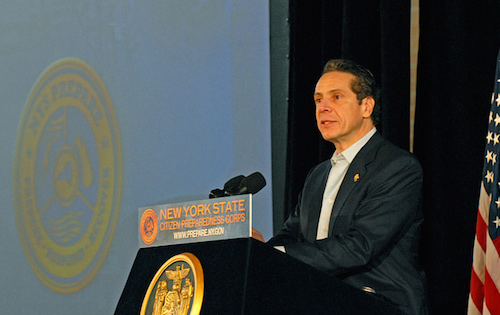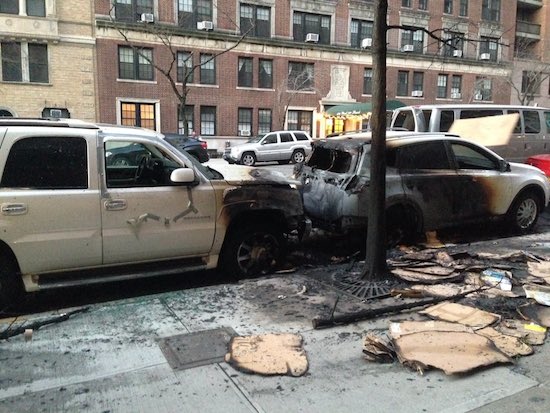 Cuts in a rent-assistance program the state used to fund have pushed more people into homelessness, says Marc Greenberg, the executive director of the Interfaith Assembly on Homelessness and Housing, a nonprofit on 105th street that helps the homeless and advocates for supportive policies. The governor now needs to commit to building supportive housing, a much cheaper and more effective method of keeping people out of homelessness, he says.
Cuts in a rent-assistance program the state used to fund have pushed more people into homelessness, says Marc Greenberg, the executive director of the Interfaith Assembly on Homelessness and Housing, a nonprofit on 105th street that helps the homeless and advocates for supportive policies. The governor now needs to commit to building supportive housing, a much cheaper and more effective method of keeping people out of homelessness, he says.
After the state stopped funding a rent-assistance program called Advantage in 2011, the Bloomberg administration followed suit, cutting off aid to over 10,000 families; homelessness jumped by a quarter by the end of Bloomberg’s term two years later. “The governor has never been held accountable for that,” Greenberg said.
De Blasio reinstated the program, now called LINC, which gives needy working families and domestic violence victims a few hundred dollars a month, but the state hasn’t reinstated its share (the state helps fund a portion of one kind of voucher). Meanwhile, the shelter population has continued to grow; about 58,000 people sleep in shelters now, including about 23,000 children. As we’ve reported, it can cost as much as $3,700 per unit to house homeless people, and unlike virtually all other cities, New York is required by law to offer shelter to any homeless person.
Greenberg is now hoping the governor announces plans to match the mayor’s commitment to building 15,000 supportive housing units in the city, as well as 5,000 more in other parts of the state. Those units of affordable housing have on-site supportive services, and they tend to get more community support than shelters, whose population is more transient. Previous governors, including Cuomo’s father, have partnered with the city before to build supportive housing.
The program is called NY/NY4. So far, about 300 organizations have signed on to support the plan, as well as have 133 of 150 members of the New York State Assembly and 280 faith leaders. Local state senator Brad Hoylman was among a group that sent a letter to the governor in support. On Thursday at 1 p.m., the group plans to send a message.
“We are using something called a Thunderclap,” Greenberg says. “It’s designed to send hundreds of thousands of messages on social media to encourage Governor Cuomo to commit to 20,000 supportive housing units.” To learn more, go here.
The governor has not announced his intentions, but plans to speak about homelessness plan in a state of the speech next week.
Photo via flickr.








I have no problem with giving poor but hard working people a stipend to help them pay their rent.
But it seems like these housing advocates are in favor of throwing money at people who simply can’t get their act together.
As long as NYC is “required by law to offer shelter” to everyone the demand for shelter will continue to grow.
Shamir, as an advocate quoted in the article I am certainly not in favor of “throwing money at people who can’t get their act together” In fact, supportive housing gives people who are struggling to stabilize their lives (many of whom are working) to get back off the streets and become contributing members of society. Also, the fact is for every person placed in supportive housing taxpayers save more than $10,000 a year over the combination of shelter, hospitals and jails that people who are not permanently housed. Frankly, our current system of shelters instead of housing is “throwing money at people” but these are the building owners who are scamming the system due to an inadequate supply of supportive housing.
Perhaps you’d endorse policies that have the best proven track record at helping the homeless? Better to spend it on what works, right?
There has been a fair amount of research on this. I threw a few links at the bottom. But, for those who dont feel like clicking through:
The research is pretty set on a few things. The best way to end homelessness in the short term, and prevent future homelessness longer term is through combining several things:
1) Housing First – the idea is that people need stability in order to get their lives in order. Giving someone housing enables them to better get treatment, a job, etc.
2) Treatment – identify the causes of the homelessness and actually fund people to treat those underlying causes.
Basically, giving someone a home, and assisting them in making changes so it doesnt happen again.
What doesnt work?
Expecting people to somehow pull themselves up by their bootstraps. There are often far too many hurdles to overcome.
Making housing contingent on something like sobriety, jobs, education. You pull the rug under someone’s feet before they can make a permanent change.
So while we may not like the idea of giving housing to the poor or “people who cant get their act together”, at a large expense, doing this may result in saving money in the long run. Because those people who “cant get their act together” likely cannot get help and change without it, and will continue to struggle, costing you more money in the long run.
https://www.nhceh.org/research-advocacy/evidence-based-practices
https://hamiltonfamilycenter.org/latest-news/promising-practices/
https://www.frontlineservice.org/about-us/evidence-based-practices/
thanks for covering the views of affordable housing advocates like Marc Greenberg.
if the commenter above is against “throwing money at people”, then i assume he is against the mortgage interest deduction, which on the UWS mainly benefits the rich and the upper middle class.
I oppose the mortgage interest deduction. I also oppose welfare programs. The way to help people is through private charity and through a growing, job-creating economy.
The concept that the mortgage interest deduction only benefits the rich and upper middle class in the uws is a crock of.. the deduction benefits anyone who is a homeowner. So if you are implying that everyone who owns an apartment on the uws is either rich or upper middle class than you are out of touch with what middle class is in new york city.
If we abolished the deduction apartments would become even more unaffordable and all those middle class folks who can now barely afford to own an apartment would not be able to afford and we would become renters to the wealthier.
The whole point of the deduction is to help people afford to own.
If you want to help the homeless and poor, stop paying sro’s and corporations ridiculous amounts of money to provide substandard housing in the most expensive city in america. The amount of money you will save in providing shelter in someplace other than manhattan can be used for more rehabilitative efforts such as treatment. Cramming folks into crappy buildings in the 90’s is just a poor use of taxpayer money.
1000x this. Supportive housing in Manhattan means only a few can be helped and in most cases the help will be crappy
Most apartment owners in NYC are not rich and upper middle class. Most are people whose major asset is their homes and they often struggle to pay their mortgage and maintenance.
If the mortgage interest deduction was eliminated it would be devastating to many people.
If losing mortgage interest deduction will break you then perhaps you shouldn’t have gotten a mortgage in the first place.
Fortunately, I doubt many owners Manhattan are living that close to the edge, if only because co-op liquidity requirements are so high that you’d be unlikely to be approved by the board. They’re much more conservative than banks.
This is a good point. This deduction really impacts the people who pay more than they should in a mortgage to live in NYC (ie: many commenters here, myself included).
So, given that you arent opposed to helping people who struggle to make ends meet to pay their rent, why are you opposed to “throwing money at people who simply cant get their act together”? Who are those people?
Who are the “deserving” poor who should get help? Who are the “non-deserving” poor who should just get it together?
he said “throwing money at people who simply can’t get their act together” if you go back and read it.
I favor abolishing the mortgage interest deduction (even though I benefit from it) as well as not flushing taxpayer’s hard-earned dollars down the toilet by throwing money at problems without critically evaluating the sources of those problems. When I think about how hard I work to pay $3,700 in NYC taxes and then read that the city is throwing that money at negligent “shelter” it makes me look for any legal means I have to not pay those taxes anymore. I have a low tolerance for wasting money as someone who grew up with very very little of it.
They money the city and other government entities (looking at you, MTA) is staggering. Should New York benefit from the economies of scale such density brings? Why are our taxes so much higher there than anywhere else in the country except California?
People are so cruel, they only care that they don’t have to look at homeless people. Out of sight and out of mind. The Governor is the worst, he only cares about re-election and his Westchester state of mind. They are so out of touch with New Yorkers and I’m glad we have a mayor who doesn’t just order the police to harass and violate the civil rights of homeless people on the street by criminalizing them. Cuts to state funding and destabilizing buildings illegally is what leads to more homeless on the street. Broken windows = broken lives.
It never ends does it. As I said in another thread, the best solution to this problem of drug and alcohol addiction (yes people, that’s what it is) is to send these folks out of town. Remove them from their problem “friends.”
There is a big country out there. Lots of cheap land to be had. Let them rent a house in Rochester, or Saginaw, or Toledo. WHY are they in the most expensive city in the land, other than to game the system. And to justify the existences of a legion of parasitic social workers who, without the homeless, would be homeless themselves.
I don’t know anything about Toledo or Rochester but I don’t see any upside to sending drug and alcohol addicted people to live in Saginaw. Cheaper to live there? Yep, I suppose you can ‘rent’ a burnt out boarded up house as opposed to living on the street or a shelter in NYC, but it isn’t going to improve the already deplorable conditions there. Why can’t this city/state take care of it’s own?!
Well stated!
NYC is the home of the ‘homeless industrial complex’. Billions of dollars and thousands of ‘workers’ These folks have no interest in actually ending homelessness. What would they do with their Masters in Social Work? What would all the DHS workers do? Its all a scam. The majority of NYC homeless are unemployable. They are MICA- mentally ill chemically addicted. Go volunteer at Holy Apostles in Chelsea. These guys are between 40 and 60. They have no education or job skills or work experience. Many read and write at the 3rd grade level. Some have criminal records and felony convictions. They will never be self sufficient. The idea that wage stagnation and housing costs are responsible for the situation is false. These folks will be in the system for the rest of their lives. There is no place for them in the modern workforce. They ‘hustle’, sell loose cigarettes, sell weed etc. This is the reality. Many of these people are from the projects. They are deadbeat dads who have girlfriends and kids in shelters or public housing. This is the underclass of NYC.
Some of them are frauds who earn excellent living by begging and living like the homeless. The worse they look sometimes, the more phony they are. Remember the lady that was lying and dressed with a plastic garbage bag near Bergdorf, until she was exposed by the NYPost.
DO NOT GIVE MONEY TO THE HOMELESS! Give to your church.
I am a social worker – and I’ve worked with the homeless population. I am all about supportive housing – it’s a great service and it does work. But many people don’t want it as it as seen as restrictive or just for people who are “really crazy” (and that’s never them). So as it is – it’s really not the solution to homelessness. Unfortunately, for those who do not choose to be homeless (and there is a healthy subset of folks who make this choice) they NEED support to maintain housing. Often (not always) a series of poor choices precedes homelessness. THATS the cycle that needs to be broken. People need help with budgeting, decision making, getting childcare, job training – all of those things. Homelessness is often the outcome of poor life skills – not because people are lazy or ignorant, but because they have never had the opportunity to learn them.
Lots of the young “homeless” who sit on the sidewalk reading a book, seem to be part of a cult, and probably are directed by a “leader” to beg for a living. Do not support the beggars-many of whom are frauds that are doing it as a hobby for extra cash .